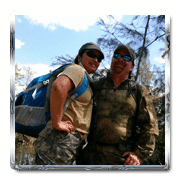|
Listen To The Article
|

Courtney and Charley founded P.R.E.P. several years ago to help educate fellow Americans in preparedness and survival.
While there appears to be ample prepping training courses in the Southern and Western regions of America, those of us who live in the Midwest or Eastern regions of the state are often left with only two options when it comes to enhancing our survival and off the grid skills: spending a lot of money to travel elsewhere, or garnering our knowledge solely from reading a book or website post. P.R.E.P. is about to solve that problem with virtual training courses.
The Personal Readiness Education Programs (or P.R.E.P.) company was founded in Florida just a few years ago. Owners Courtney and Charley saw a void in the preparedness-training realm and made it their mission to educate as many of their fellow Americans as possible. The struggling economy and lack of preparedness for natural disasters were among the driving forces behind the decision to open a training center in the southern region of the Sunshine State.
The pair of prepping experts wanted to go beyond the basics of self-sufficiency education and delve deeper into the mindset and skills necessary to survive a massive natural or man-made disaster and the civil unrest which would likely follow.
Off The Grid News recently sat down with the P.R.E.P. founders to learn more about the opportunities for in-depth self-reliance training and preparedness activities.
OTG: Why did you decide to turn your strong beliefs about the need to be prepared into a business?
PREP: We started the business in 2011. We made this decision at the beginning of hurricane season, when we realized that there was a very superficial understanding of hurricane preparedness. A lot of the local businesses have hurricane supply checklists, but if you don’t understand the “why” behind those items, then the list is useless. We realized that there was a real need for substantive knowledge on preparedness and that there were a lot of people who wanted to learn more, but were simply overwhelmed by the amount of information—and misinformation—on the Internet. Our goal is to provide accurate and thorough knowledge to our clients in order to keep their families safe. What started as a small idea about hurricane preparedness has grown into a business that encompasses all things preparedness, and we share our information with new and veteran preppers alike.
OTG: P.R.E.P. classes are designed to teach the entire family to embark on a proactive journey to becoming more self-reliant. What types of courses are currently being offered at your Florida location?
 PREP: We believe that there are seven main areas of preparedness: food, water, shelter, security, first aid, energy, and communication. Our classes focus on these topics and aim to provide a well-rounded, multi-faceted approach to preparedness. We want our clients to understand the who, what, why, when and where of preparedness, and we make it easy to understand and make a workable plan for their families. You’re never going to get a shopping list and a list of instructions from us to go out and spend thousands of dollars. We aim to educate and to give our clients the peace of mind in knowing that they are helping to keep their families safe for everything from unexpected unemployment to full-on EMP attack.
PREP: We believe that there are seven main areas of preparedness: food, water, shelter, security, first aid, energy, and communication. Our classes focus on these topics and aim to provide a well-rounded, multi-faceted approach to preparedness. We want our clients to understand the who, what, why, when and where of preparedness, and we make it easy to understand and make a workable plan for their families. You’re never going to get a shopping list and a list of instructions from us to go out and spend thousands of dollars. We aim to educate and to give our clients the peace of mind in knowing that they are helping to keep their families safe for everything from unexpected unemployment to full-on EMP attack.
OTG: You will soon be offering online courses so folks who do not live in the Sunshine State can also enhance their prepping skills. How did this decision come about, and what will the experience be like for virtual learners?
PREP: We’re working to develop an online curriculum that will be very similar to sitting in a live class. You’ll get all the background information and class materials, and we hope that this virtual experience will be a good one for all participants. We’re always available to answer questions, and we’re happy to get feedback on what people would like to see in our online classes. Feel free to email us with any questions or suggestions.
OTG: Have you noticed an increased interest in prepping due to the EMP threats by North Korea?
PREP: I don’t know that there’s been an increase in prepping per se, but there has been a slight increase in people who want additional knowledge on EMPs and their potential effects. The hunt for knowledge has become a bit more important to people.
OTG: What do you see as the likely scenario in America if an EMP, solar flare, or computer hacker successfully takes down our antiquated and overly taxed power grid?
PREP: First there will be shock, and then there will be panic. Then, those people who are not prepared will begin to see out those who are prepared. This is one of the reasons that we stress OPSEC, or operational security, to our clients. Try not to make yourselves a target. In order to keep your family safe, it means that you have to keep your level of preparedness safe… and silent. The most important part of this is planning and making sure that you and your family have a plan in case one of those scenarios takes places.
You need a lot more than, “Well, we’re just going to bug out.” Okay, what does that mean? How many people are you planning on taking with you? Where are you going? What happens if an EMP takes place and you’re at your work office, your spouse is miles away at their office, and your kids are at two different schools? Do they know what to do? These are conversations that you should be having with your family so that you can remain calm and not join in the mass panic. We actually teach a class on how to get others to prepare and how to prepare your family and your pets, so that you can keep everyone safe and sound.
OTG: What are the top major issues anyone concerned about preparedness should take into consideration?
PREP: The major issue is planning. You must take a good, hard look at your personal situation and develop a plan for you and your family. Before you start worrying about a major pole shift, think about the most likely hazards in your area. For instance, are you close to a nuclear power plant? How far away are you from a hospital? Is your area prone to flooding during a hurricane? What would happen if you lost your job today? Once you determine your top hazards, then it’s important to do a hazard analysis and determine what the possible consequences of the hazard actually are. This is why we developed an entire micro series on planning and analysis. You have no idea how many people tell us that their plan is to just bug out, but they have no plan, no supplies, and just assume they can get in their car and drive… somewhere. Planning is EVERYTHING!
 Off The Grid News Better Ideas For Off The Grid Living
Off The Grid News Better Ideas For Off The Grid Living



